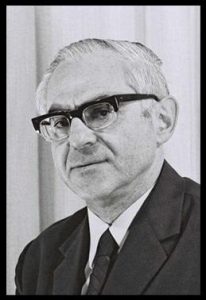O n June 5, 2003, Meir Vilner passed away in Tel-Aviv, at the age of 84. For many years he had been the leader of the Communist Party of Israel, and later also of Hadash (Democratic Front for Peace and Equality). For about forty years he was a Member of the Knesset, and was the last living signatory of the Israeli Declaration of Independence.
n June 5, 2003, Meir Vilner passed away in Tel-Aviv, at the age of 84. For many years he had been the leader of the Communist Party of Israel, and later also of Hadash (Democratic Front for Peace and Equality). For about forty years he was a Member of the Knesset, and was the last living signatory of the Israeli Declaration of Independence.
Meir Vilner was born in 1918 in Vilnius (then in Poland , now capital of Lithuania). He graduated from the Hebrew high school "Tarbut", and in his youth was member of the "Hashomer Hatzair" youth movement. In 1938 he came to Mandatory Palestine, in order to study at the Hebrew University of Jerusalem. In 1940 he joined the Communist Party, then maintaining an underground existence.
He was a member of Mo’etzet Ha'am, the semi-parliamentary institute of the Jewish community under British rule, and later of the Interim State Council established with the creation of Israel. For many years he was a member of the Communist Party's leadership, serving as Secretary-General from 1965 to 1990 and as Chairman from 1990 to 1993.
In 1977 Vilner, with his comrades in the party leadership, took the initiative and founded Hadash (Democratic Front for Peace and Eqaulity) and became its first Chairman.
For many years Meir Vilner was the chief editor and publisher of the party’s newspapers, and at various period – of its theoretical organs as well. He wrote many articles, and authored brochures and publications on a very wide spectrum of subjects.
Meir Vilner was a personality well known throughout the International Communist Movement. A large number of articles from his pen were published over the years in many Communist and left-wing papers and theoretical organs all over the world.
In 1945 Meir Vilner participated in the founding Congress of WFDY (World Federation of Democratic Youth) which took place in London. He participated in many regional and international meetings of the communist movement, as well as in Congresses of fraternal parties.
Meir Vilner considered as his biggest achievement the creation and maintenance, together with his comrades – and in spite of very complicated and difficult situation – of a unique political body in which Jews and Arabs could live and act together in equality and amity, maintain a common struggle for a just peace, for equality of the Arab population and for defence of workers' rights.
Vilner stood fast in his adherence to the Communist Marxist-Leninist ideology. He was convinced that despite all the upheavals, which the world has seen in the past years, socialism will finally prove to be humanity's future. He steadfastly expressed his principled ideological and political convictions, even when they were unacceptable to many and when voicing them was far from easy. He always struggled for the positions he considered correct and in the true interest of both peoples of the country, the Jews and the Arabs.
In 1956 Vilner, together with his lifelong comrade Taufik Tubi, exposed the horrors of the Kufr Quasem Massacre – horrors which the government of the time spent enormous efforts to conceal from the Israeli and international public. With the outbreak of war in the same year, it was the Communist Party – with Meir Vilner as part of its leadership and parliamentary representation – who stuck to a principled anti-war position, despite all the incitement and threats to which it was exposed.
In 1967, shortly after the outbreak of the war which he once again outspokenly opposed, Meir Vilner was stabbed and wounded during an assassination attempt by a member of the right-wing Herut Party. At the time, Vilner personally and his party were the target of an incitement campaign on a scale which would be nearly inconceivable nowadays. That was due to his policy of opposing the occupation and calling for its termination, steadfastly opposing war and advocating the recognition of the Arab Palestinian people's right to establish an independent state side-by-side with Israel.
In 1976 Vilner, together with the late leader Taufik Ziad, played a very important role in taking the historical decision to hold a general strike on March 30 that year. It was that decision which led to the first Land Day, which marked a major turning point in the struggle waged by the Arab population in Israel against land confiscations and for equal rights.
On June 8, 1982, Meir Vilner stood on the Knesset floor and presented on behalf of the Hadash parliamentary faction the historic motion of no confidence in the Begin Government, which had two days earlier launched a new war with the invasion of Lebanon. The parliamentarians of Hadash faction were the only ones in the Knesset who opposed from its very first day what was to become later the highly unpopular Lebanon War. The Communist Party and Hadash were also among the central initiators of the first protest actions, held at different locations throughout the country immediately upon the outbreak of the war.
Even in his old age Meir Vilner continued to take an active part in protest actions against the occupation, against the discrimination of the Arab population, against economic austerity policies and against war – for as long as the state of his health made such activity possible.
